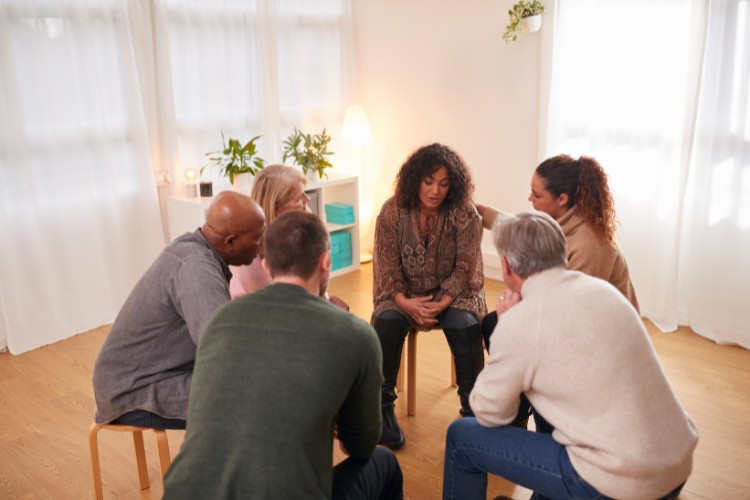Daily Coping Strategies to Overcome Grief and Loss

Have you found yourself grappling with the profound impact of losing a loved one? You're not alone. Many struggle to find stability in the wake of such loss. Grieving is deeply personal, yet there are structured strategies that can offer comfort and a path toward healing. This detailed guide will walk you through various daily coping mechanisms that are both practical and comforting, helping you regain a sense of control during difficult times.
Establishing a Simple Daily Routine

A predictable daily routine can anchor you during times of emotional turbulence, providing structure and stability:
- Morning Rituals: Begin your day with a calming routine that sets a positive tone, such as meditation, a gentle stretching session, or simply sitting quietly with your thoughts. This intentional start can significantly impact your mental state throughout the day.
- Scheduled Meals: Grief can disrupt your appetite and eating habits. Setting specific times to nourish your body helps maintain your physical health and establishes a routine during your day, which can be comforting.
- Consistent Sleep Patterns: Grief can also disrupt sleep. Aiming for consistency in your sleep schedule by going to bed and waking up at the same time each day can help stabilize your mood and improve your energy levels.
Prioritizing Self-Care

Taking care of your physical and emotional health is crucial during the grieving process:
- Regular Physical Activity: Incorporate simple exercises like walking or light yoga into your daily routine. Physical activity can elevate your mood, reduce stress, and increase energy levels.
- Healthy Eating: Choose foods that are nourishing and comforting. Good nutrition supports overall well-being, essential during times of stress and sadness.
- Relaxing Activities: Make time for activities that you enjoy and find relaxing. This might include hobbies like knitting, reading, or listening to your favorite music. These activities can serve as a temporary respite from your grief.
Acknowledging and Expressing Emotions

It’s essential to recognize and express your feelings to heal:
- Journaling: Writing provides a way to articulate your thoughts and emotions safely and privately. It can help you process feelings and may bring clarity to your experiences.
- Artistic Expression: Engaging in creative activities such as painting, drawing, or writing poetry can help express emotions that are hard to verbalize, providing a therapeutic outlet.
- Sharing Your Grief: Talking about your loss with trusted friends or family members can provide comfort and decrease feelings of isolation. Sharing can help you process your grief and garner support.
Engaging in Meaningful Activities

Purposeful activities can help restore a sense of normalcy and connection:
- Volunteering: Giving your time to help others can provide a sense of purpose and connection, which are often lost in grief.
- Engaging in Hobbies: Reconnecting with activities that bring you joy can be therapeutic. They provide a distraction from grief, allowing you to focus on something positive.
- Setting Goals: Small, achievable goals can give you something to strive for each day and a sense of accomplishment, which is crucial when days seem aimless.
Staying Connected

Keeping in touch with others is essential for emotional support:
- Maintain Social Contacts: Regular contact with friends and family can provide a necessary support network. Social interaction can help prevent feelings of loneliness and isolation.
- Join Support Groups: Connecting with others who are experiencing similar feelings can provide comfort and understanding. Support groups offer a space to share experiences and coping strategies.
- Professional Help: If grief becomes overwhelming, seeking help from a grief counselor or therapist can provide structured guidance through the grieving process.
Creating Personal Moments of Reflection

Reflective practices can help you connect with your feelings and honor your loved one:
- Memorial Rituals: Creating personal rituals to remember your loved one can offer comfort. This might include lighting a candle daily, visiting a favorite place, or celebrating their life on significant dates.
- Meditation and Mindfulness: These practices can help manage grief by focusing on the present and finding a peaceful center amid emotional turmoil.
Managing Stress with Healthy Distractions

Sometimes, temporary distractions are necessary to manage intense emotions:
- Leisure Activities: Allow yourself moments to escape into activities like watching a movie or gardening. These can provide a necessary break from grief.
- Active Engagement: Involvement in activities that require physical or mental engagement can help distract from painful emotions temporarily, providing a rest from grief.
Grief is a journey with no set timeline, and coping with loss requires patience and self-compassion. Implementing these daily coping strategies can provide structure and relief as you navigate this challenging path. Remember, it’s essential to move at your own pace and allow yourself to feel whatever comes your way.
For additional resources on managing grief or to find support systems, visit Celestis. Here, you can also explore unique ways to memorialize your loved one, helping you honor their memory as you find your way forward.


